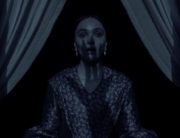Childhood is a time when boundaries are set and tested. As such, the line between kindness and cruelty can be especially hazy. René Clément’s Forbidden Games (1952) dramatizes two children’s fascination with death, which leads them to kill an animal; Richard Hughes’s brilliant novel A High Wind in Jamaica (1929) views a group of children through an incredibly unsentimental lens, and their testing of boundaries lead them to horrifying acts.
The Innocents, a new film from Eskil Vogt—Joachim Trier’s longtime co-writer (The Worst Person in the World)—is also dedicated to portraying children neither as angels nor demons per se, though we discover that some can be much crueler than others. Early on, Ida (Rakel Lenora Flottum), who is about seven, pinches the thigh of her older sister, Anna (Alva Brynsmo Ramstad), to see if she responds. She does not: She is severely autistic, and this is one of the symptoms of her autism. (Later, Ida squashes a worm with her foot, hinting at some of her actions to come: She and others will experiment with the limits of hurting others.)
Ida and her family have moved to a new place, and she is frustrated with the disproportionate attention her sister receives. On the playground near the apartment complex, she meets a boy, Ben (Sam Ashraf), who seems similarly isolated and anxious to play. She soon discovers him to be a practitioner of a strange gift: he can move objects with his mind. Also, he is prone to cruelty and anger. It turns out he is not the only child in the neighborhood with unusual gifts: Anna and a young girl named Aisha (Mina Yasmin Bremseth Asheim) can telepathically communicate with one another and with Ben. The three begin to experiment with these abilities and, predictably though not without impact, there are incredible consequences. Their powers are subject to the sudden whims and angers of children, and in Ben’s case, they quickly become dangerous.
This is a hard film to fully reject or embrace. Its chief strength, perhaps, is the deft interweaving of the children’s dangerous games with more innocent ones. They handle their gifts, as they explore them, much like kids learning to play telephone or catch, and the authenticity in the child actors’ performances serves to give these sequences an unexpected depth. None of the children, even Ben, is wholly good or bad, and all, in their own way, face trouble at home. While I found this device a little obvious, it at least gave their struggles context. Evocative shots of the small town and its surrounding woods and a rich soundscape, which brings to life the sounds of nature and the playground, effectively create the atmosphere of the seemingly safe neighborhood where the disturbing actions take place.
The film also admirably does not steer its eye from violence. Although I admire Vogt’s boldness, I can’t say I am at peace with the way he handled it. Certain scenes theoretically shine a light on the darker aspects of childhood, when one’s moral compass is not yet fully formed and when emotions are especially volatile, yet they ultimately feel more like button-pushing, or like an organ player pounding a dissonant chord. Without giving too much away, there are scenes of murders, macabre more for the content rather than the imagery. If they convey anything, it is nothing outside the realm of the obvious: that children are capable of cruelty. There is plenty of trauma in this film, though very little processing of it, which, coupled with its ponderous pace and tone, keep The Innocents from becoming a fully rewarding experience.

















Leave A Comment